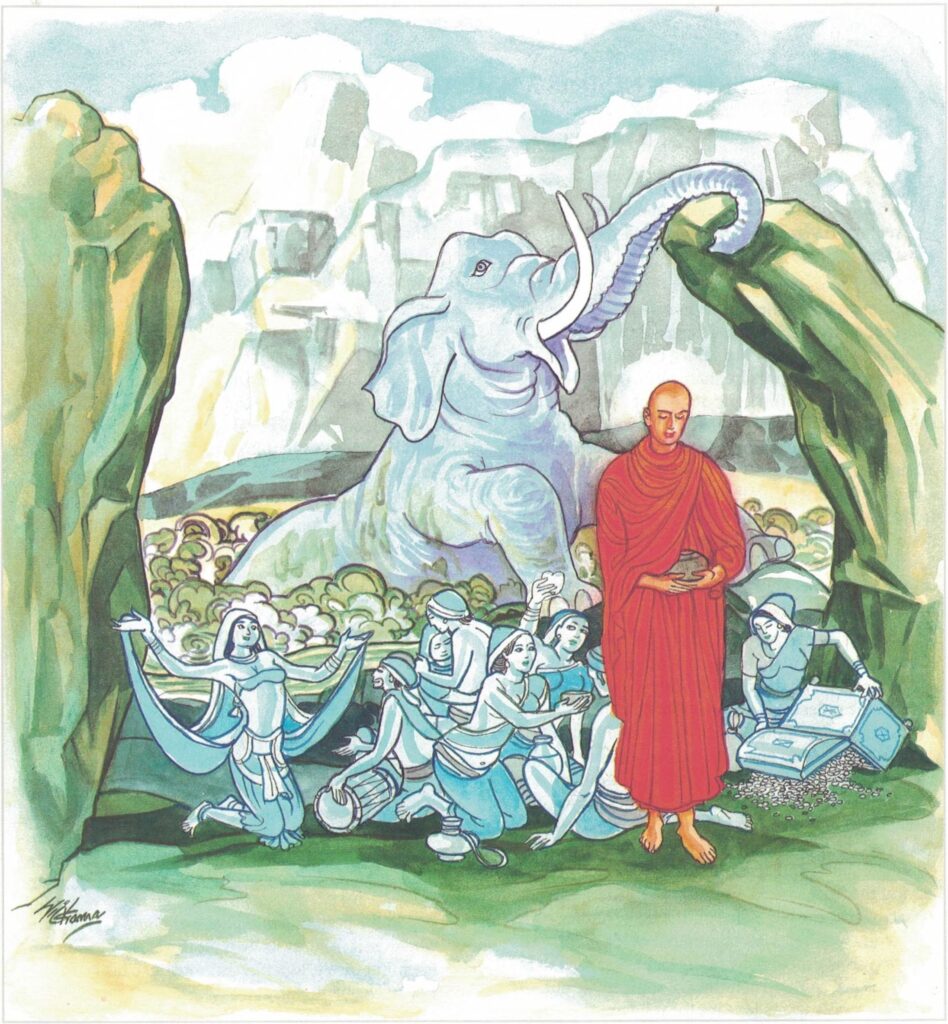Pali text, illustration and English translation of Dhammapada verse 327:
appamādaratā hotha sacittam anurakkhatha |
duggā uddharath’attānaṃ paṅke satto’va kuñjaro || 327 ||
327. Do you delight in heedfulness and guard your own minds well! Draw yourselves from the evil way as would elephant sunk in slough.

The Story of the Elephant Called Pāveyyaka
While residing at the Jetavana Monastery, the Buddha spoke this verse with reference to the elephant called Pāveyyaka.
Pāveyyaka when young was very strong; in due course, he became old and decrepit. One day, as old Pāveyyaka went into a pond he was stuck in the mire and could not get on to the shore. When King Pasenadi of Kosala was told about it, he sent an elephant trainer to help the elephant get out of the mire. The elephant trainer went to the site where the elephant was. There, he made the musicians strike up a martial tune. Hearing the military airs, the elephant felt as if he were on a battlefield; his spirits rose, he pulled himself with all his might, and was soon out of the mire.
When the monks told the Buddha about this he said, “Monks! Just as that elephant pulled itself out of the mire, so also must you all pull yourselves out of the mire of moral defilements.”
Explanatory Translation (Verse 327)
appamādaratā hotha, sacittam anurakkhatha,
paṅke satto kuñjaro iva attānaṃ duggā uddharatha
appamādaratā hotha: take delight in diligence; sacittam: one’s mind; anurakkhatha: protect; paṅke: in mud; satto [satta]: mired; kuñjaro iva: like an elephant; attānaṃ [attāna]: one’s mind; duggā: swampy road difficult to traverse; uddharatha: lift up
Take delight in mindfulness, guard your mind well. As an elephant stuck in the mire pulls itself out, so also pull yourself out of the mire of moral defilements.
Commentary and exegetical material (Verse 327)
A method of instruction favoured by the Buddha was the culling of a moral or spiritual truth out of contemporary events. In this stanza the successful effort made by the mired elephant to pull itself out of the mud was made the occasion to instruct the monks, that they themselves should make an effort to pull themselves out of the mire of moral defilements.
There are other instances of the Buddha utilizing an incident to teach people the truth. The following is one such:
A monk was suffering from diarrhoea, and being unable to get up was lying in his own excreta. The Buddha entered his residence in the company of Venerable Ānanda, and asked, ‘What is your ailment, monk?” “Venerable, I am suffering from diarrhoea,” replied the monk, “Is there nobody to attend on you” “No, Venerable.” “Why don’t the fellow monks attend on you?” “As I do not attend on other monks, they, too, do not attend on me,” said the monk.
The Buddha asked Venerable Ānanda to go and bring water. The Buddha poured water on the sick monk, and Venerable Ānanda washed him. The Buddha took him by the head, and Venerable Ānanda held him by his feet, and they placed him on a bed.
The Buddha called the monks, and advised them that they should attend on a sick monk, whether he had attended on them nor not. “The monks who attend on the sick, really attend on me,” said the Buddha.